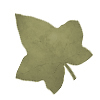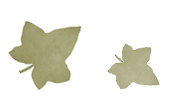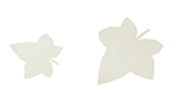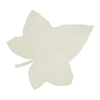


|
"They made a good deal of camomile tea, which they drunk freely to ward off colds, to soothe nerves, and as a general tonic. A large jug of this was alway prepared and stood ready for heating up after confinements. The horehound was used with honey in a preparation to be taken for sore throats and colds on the chest. Peppermint tea was made rather as a luxury than a medicine, it was brought out on special occasions and drunk from wine-glasses..." Flora Thompson - Lark Rise to Candleford. Herbal
infusions have been drunk throughout the centuries
- both for their medicinal and culinary properties
- after all, our common ol' cuppa [the black tea
which came over from the Far East] is just a herb
infused in water. Herbal infusions can consist of
just one herb, or can be blended with a number of
different herbs to produce a range of tantalising
tastes. How
to make a Herbal Tea : To make your own delicious
cup of herbal tea simply place a teaspoon of dried
herb [or herbs if you're using a blend of herbs]
into a tea-pot, caffetiere, or suitable loose-tea
holder and pour on freshly boiled water. Infuse
covered for 5 mins or so [roots and tough herbs
may need to infuse for longer], strain and serve.
If you're making herbal tea for more than one person,
add more dried herb just as you would with loose
tea or tea-bags. For medicinal brews you may need
to double the amount of herb and leave to infuse
for longer - generally at least 5 - 10 minutes. Not all herbs lend themselves to teas - Feverfew is so strong it is not suitable for infusions - whilst others, although suitable, should only be consumed in small quantities, such as Yarrow. Others, like Chamomile, can be safely consumed in quantities of 5 or 6 cups a day. Obviously poisonous herbs should be avoided completely, and your health condition and any medications you are on should be taken into account - Rosemary and Sage, for example, should not be taken by epileptics, persons suffering from high blood-pressure, or during pregnancy or breast-feeding; Valerian root should not be combined with sleep-inducing medicines; and Hops should be avoided by anyone suffering from depression. Always check up on any herb you're thinking of using, if in doubt ask your doctor or health professional - and remember that even the safest herbs should, like most things in life, be taken in moderation. Ready for that cuppa yet? Here's a small selection of herbal teas to tempt you.... Balm or Lemon Balm Tea - A delicious, lemon scented tea, refreshing and calming, and a tonic for mind and body. Soothing for stomach upsets and spasms, especially those connected with emotional worries or stress. A cup of Balm tea can calm palpitations and is a soothing remedy for 'butterflies' and nerves. It is also a gentle herb suitable for children, where it can be used to calm anxious or excitable children and soothe headaches. Balm is also a useful remedy for chicken pox and shingles - not only as a tea but also as a wash to soothe irritated or inflamed skin. Blackcurrant Tea - A refreshing tea which counters acidity and helps cleanse the system. Dried Blackcurrant leaves need to be soaked for an hour or so in cold water before making an infusion, they will also need to infuse for slightly longer than some herbs - at least 10 minutes, and you may prefer to use 2 teaspoons for one cup. Calendula / Marigold Tea - The bright orange petals of the Marigold flower can be drunk as a tea to help remedy nettle rash and skin problems. It is also useful for remedying digestive infections and fungal problems such as thrush. Catnip Tea - As long as your cats don't get to this one before you... Catnip tea was apparently a favourite country tea long before the black tea [which is now the nation's common cuppa] arrived from the Far East. A nerve-tonic, useful for keeping colds at bay, as well as ensuring a restful sleep. It is useful tea for soothing nervous headaces and is a good digestive aide, nerve relaxant, cold preventative, and hiccup remedy. Catnip is a gentle herb and makes a suitable drink for children and will help soothe feverish chills. Chamomile Tea - Perhaps one of the most well known of the herbal teas - Chamomile is a wonderful boon to hay fever and asthma sufferers, being markedly anti-allergenic - leave to infuse covered and inhale the steam before drinking. It is also useful for calming stomach spasms, relieving morning sickness, easing indigestion, bloating and hiccups. A cup of Chamomile tea last thing at night can ensure a good night's sleep. Another gentle herb Chamomile is useful for relaxing over-tired children and offers a gentle remedy for teething. Dandelion
Tea - The leaves and petals of the humble Dandelion make a diuretic tea for treating fluid retention
and urinary infections. Unlike most diuretics, which
leach potassium from the body, Dandelion is rich
in potassium. It is also a valuable liver tonic. Elderflower Tea - A delicious, cooling tea, and one of my first choices for warding off colds and 'flu. Elderflower is also a popular folk remedy for hay fever sufferers and should be drunk a couple of months before and throughout the hay fever season - preferably sweetened with local honey. Particularly tasty blended with Raspberry Leaf. Fennel Seed Tea - A spicy tea useful for relieving windy digestive systems. Fennel Seed tea was reputedly drunk (and the seeds eaten) by the Anglo-Saxons to dampen the appetite and ward off hunger-pangs, it is also a folk remedy for relieving the aches and pains of flu.Crush 1 teaspoon of seeds and infuse covered for 10 mins. Hawthorn Tea - Good for headaches, poor circulation, and lapses of memory. Hawthorn was widely used in the past to bulk out more expensive teas - the following recipe for a popular country tea mix is taken from Barbara Griggs' The GreenWitch : "2 parts of dried Hawthorn leaves to 1 part each of Sage and Balm; or equal parts of Hawthorn, Sage, Balm and Blackcurrant leaves" Hops Tea - A sleepy brew most useful for insomnia relief. Hops are not recommended to be taken internally by anyone feeling low or suffering from depression. Lavender Tea - If you've over indulged on the alcohol the night before, an infusion of Lavender flowers makes an ideal cuppa for calming the throbbing pain of a hangover. It also soothes the digestive system and assists the liver. Limeflower Tea - A mild-flavoured, delicate tea widely drunk all over Europe and valuable as an anti-spasmodic and sedative to the nerves and digestive system. A soothing remedy for headaches, particularly those caused by nervous tension. Drink in the evening to relax, or after a meal as a digestif. Nettle
Tea - Nettles really are one of Nature's little
gems, they have so much to offer us and are full
of vitamins and minerals. Nettle tea is a superb detoxifying, cleansing tonic for
the whole body, and is particularly beneficial to
the liver and kidneys, and can help sooth eczema
and irritated or inflamed rashes and skin conditions.
Nettles are anti-allergenic - try blending them
with chamomile for a hay-fever remedy - and the
anti-inflammatory and cleansing properties make
it an ideal regular cuppa for sufferers of arthritis.
Nettle tea is also a valuable remedy for anaemia
caused by heavy menstrual bleeding. Peppermint
Tea - A refreshing cuppa which will soothe stomach
cramps, spasms and bloating, calm nausea and headaches,
and makes an excellent after dinner digestif. Maurice
Messegue, a French herbalist, proclaims it is as
"a balm for the entire digestive tract." Peppermint tea works
well as an iced drink, decorate with a sprig of
fresh mint - or add a fresh Peppermint leaf to ice-cubes
before freezing. Raspberry Leaf Tea - Another personal favourite, raspberry leaf is a refreshing and soothing tea, which blends well with elderflower. Raspberry Leaf is commonly recommended during the last 8 - 10 weeks of pregnancy to strengthen the uterus muscles and encourage easy labour. For this reason it should not be drunk before the last 8 - 10 weeks of pregnancy (please seek advice from your midwife or healthcare practitioner). Raspberry Leaf can also be drunk to relieve diarrhoea. Red Clover Tea - A mild and sweet-like-honey flavour tea which is high in calcium and has a demulcent quality making it useful for acid indigestion relief. Reputedly soothing for asthma and respiratory problems. Red Clover has an age-old reputation as a cancer preventing herb. (The flowers contain the anti-cancer compound genistein). Blends well with Raspberry Leaf. Rosemary
Tea - A light and clean tasting cuppa for getting
you going in the morning. Rosemary is a great herb to refresh a lagging mind and keep
your memory sharp, it also makes a pleasant migraine
remedy. Sage
Tea - Quite an aquired taste! Good for warding
off colds and 'flu, but if you can't bring yourself
to drink it a Sage infusion
makes an excellent gargle for sore throats. Also
useful for menopausal women suffering from night
sweats and hot flushes. Thyme Tea - Makes a good tonic for exhaustion, and drunk as a cold tea can help relieve headaches. Thyme tea is also useful at relieving urinary infections and water retention and is a popular folk remedy for flu with muscle aches and pains. Good for chest problems and for treating asthma - for the wheeziness, and shortness of breath symptoms, Andrew Chevallier [in Encylcopedia of Medicinal Plants...] suggests an infusion of 15g thyme and 15g nettles to 750ml of water - which should be sipped throughout the day. Thyme tea can also provide relief for hay fever sufferers and is considered to helpful in maintaining vitality, particularly in old / third age. Valerian
Tea - [another favourite with the felines] -
A natural sedative, and an excellent remedy for
insomnia...but very pungent! I would suggest
blending this herb with other relaxing [and pleasantly
aromatic] herbs such as Passion Flower, Limeflower,
Chamomile, or Lemon Balm, and a good teaspoon or
two of honey! Valerian Tea is also good for relieving nervous irritability,
tension headaches, and menopausal problems, or to
relieve bronchial spasms and smoker’s cough. You may like to blend two or more herbs together - here are a few tried and tested favourites in Gaia's Garden [available to purchase in the Gaia's Garden online shop] : Lemon Balm & Chamomile - A refreshing and calming blend, and a tonic for mind and body. Soothing for stomach upsets and spasms, especially those connected with emotional worries and indigestion Red Clover & Raspberry Leaf* - A soothing, pleasant tasting blend. [*Raspberry Leaf is commonly recommended during the last 8 - 10 weeks of pregnancy to strengthen the uterus muscles and encourage easy labour. For this reason it should not be drunk before the last 10 weeks of pregnancy] Mintea - A refreshing and soothing blend of Peppermint and Catnip (rich in antioxidants). A soothing after-dinner cuppa which may help ease headaches (particularly those associated with digestive problems). Not for children under 5. Nettle & Lemon Balm - Just the thing to throw of Winter's shadow and bounce into Spring. A detoxifying, cleansing, tonic brew! The Lemon Balm is soothing on the stomach and uplifting for your emotions 'Night Cap' - A relaxing, sleepy bed-time blend of Chamomile, Lemon Balm, Catnip and Valerian Root*. [*Do not take with other sleep inducing drugs]. Unwind and drift away.... I'll be adding to the list over time, so please do check back and see what's new. If you've got a herbal blend you'd like to share, or a herb you'd like to rave about I'd love to hear from you - why not visit the forum and share your passion! |
|

Gaia's Garden Library
Non Fiction Section : Gaia's Garden Herblore | Susun S. Weed Articles | Articles and Musings
Fiction Section : Short Stories & Prose| As Told
By Cat | Public Domain Texts| Poetry
Shop | Library | Gallery | Forum | Contact | Links








